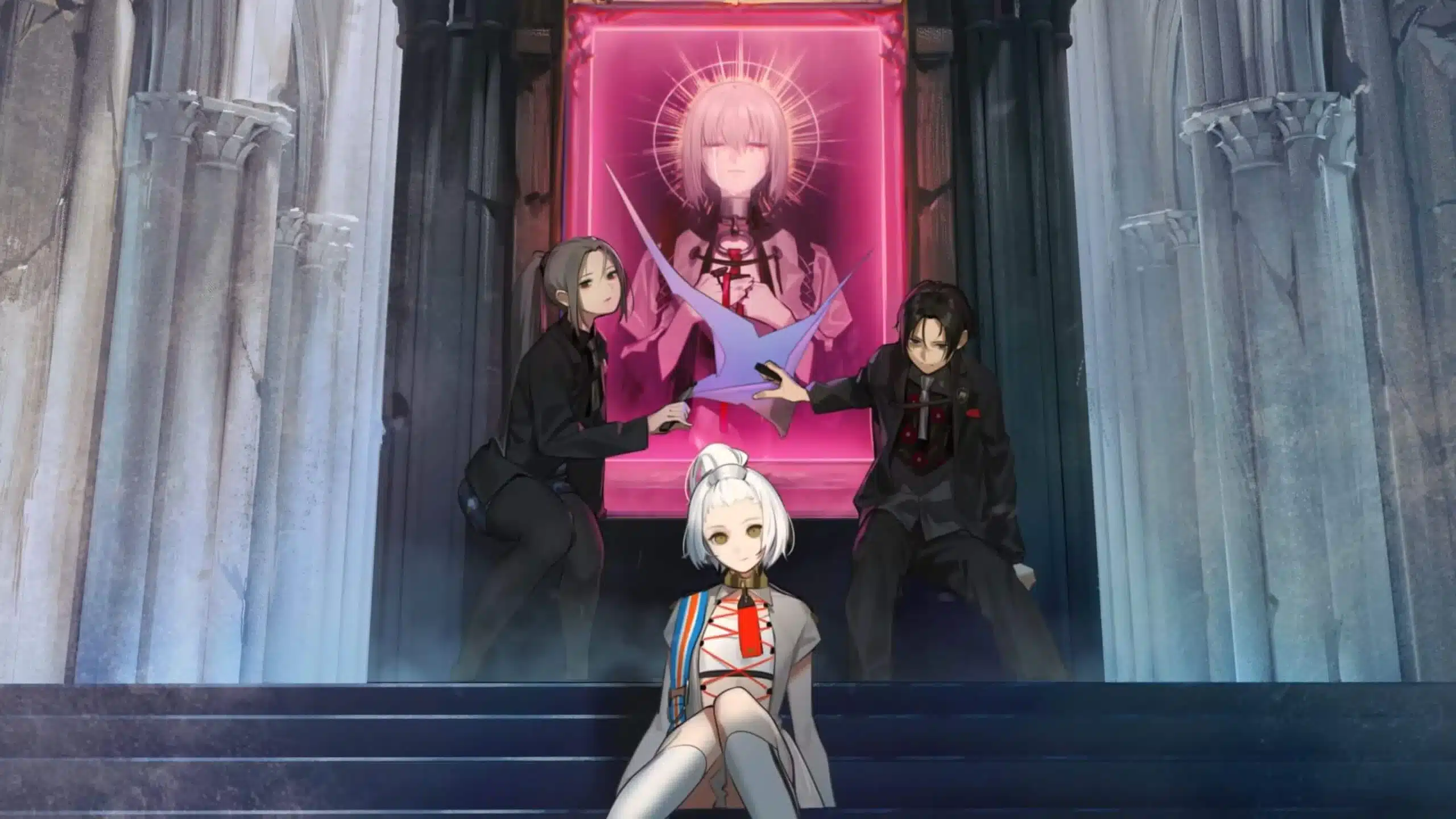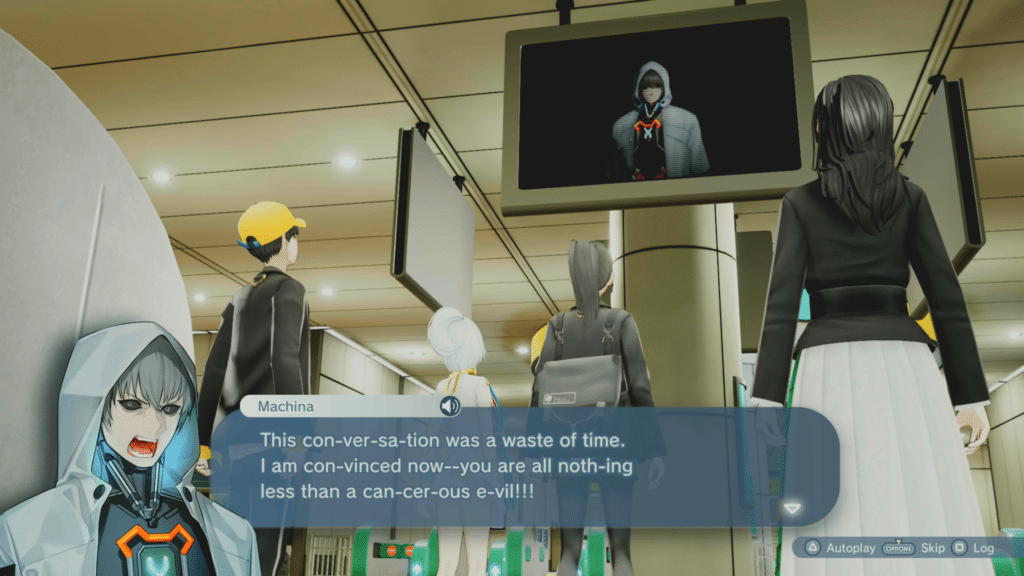

After spending the past decade or so reviewing games, I don’t think there was any game I wanted to like more than The Caligula Effect. The humble Vita title had this amazing story sandwiched between the worst combat I’ve ever experienced and repeated poor gameplay choices. This was something of a common complaint, one that The Caligula Effect: Overdose attempt to correct but still couldn’t overcome. Now that the unexpected sequel is in players’ hands, The Caligula Effect 2 hopes to correct previous flaws and bring the series forward. Given it shares some ideas with the past, will it be more successful or is it living in a fantasy world?
Taking place after the events of The Caligula Effect, players control a player-created character, with the only choice being name and gender, living in the world of Redo. One day a crack in the sky causes them to realize something is wrong with this world and slowly they start to see the cracks. Eventually, you meet X, the daughter of μ, who created the virtual world Mobius in the first game, who wants to destroy this world.


As players progress, The Caligula Effect 2 explores similar themes as the previous title and early Persona titles. Regret is a huge component, along with moving forward, singing and deciding who you are as a person. It makes for a compelling story that quickly grabs players without letting go.
One of the biggest problems with the combat system is timeline, which was problematic in the previous title as well. For those unfamiliar, what makes this series combat unique is how attacks play out. Instead of a fixed turn order, players perform attacks that have various conditions, which makes tactics extremely important.
Where things start to differ is seeing each and every move play out. The idea is rather simple and I’ll illustrate it with the tutorial on back attacks. In this fight the player created character and Gin fight against two enemies. Gin has the ability to use Quicksilver, a three-shot attack, or Iron Piercer, a single blast that does considerable damage. Each move has a set amount of time between turns, Iron Piercer being longer, with timing for each attack. Once you decide what to do, select an enemy and a scenario will play out.
Before deciding to attack, players can see the potential outcome of each action and then adapt around it. The reason why I decided to explain this specific fight is due to one of the enemies, a Soulless Worker, choosing to attack my player-created character, coupled with Gin’s position. If I attack as soon as possible, I’ll damage the enemy, but if I delay my attack I can attack both the Soulless Worker and Gloomy Student. During my character’s turn, I can use Slash Raid, which based off the anticipated position, will deal damage to both enemies.
This brings us to the issue with the system. At the top right you might notice 86 percent listed. This shows the likelihood of this event playing out as expected. Inputting more commands changes the odds, though I found things rarely play out as predicted. This isn’t a problem for the tactic I previously mentioned, Gin and my character are going to attack regardless, it just makes it hard to invest in this system. Certain later skills really play off each other, making for a really cool concept, it’s just a massive time investment that might not even pay off. There is nothing more frustrating than the 1 percent chance occurring and ruining your whole turn.
An advantage to the system is anticipating attacks and defending them. Since the system tells you how much damage you’ll potentially take, it allows players to opt for a different strategy. This can range from selecting moves with the appropriate amount of power, or simply knowing when to defend.
Another improvement is allowing AI to control other characters. Instead of figuring out how multiple characters should move for every fight, this can be enabled when you’re sure to win and disabled when every move counts.
Beyond that, The Caligula Effect 2 offers its own unique take on many traditional concepts. Attack and defense items are generally named after traits and elements, like positive outlook or dark humor. There is a meter to apply some kind of advantage to your team for a period of time, break system with special attacks, among other things.
Outside of combat is your standard linear world to explore. Player’s can visit various locations, where there are enemies, resources, and typically a boss to overcome. Unfortunately, not a lot of control is given beyond a general action button and an attack to start a fight.
Another strong element worth addressing is the OST. Since music is an important part of The Caligula Effect 2, the soundtrack is simply phenomenal. There is a lot of action-packed, exciting, and intense music that drives the experience forward. Be it exploration, buffing, or giving the enemy an advantage, it really stands out and elevates the experience.
The Caligula Effect 2 (PS5): Not much has changed between The Caligula Effect 2's original release and its return on PlayStation 5. Outside of performing a little better and having a somewhat more refined look, the experience remains unchanged. For this reason I wouldn't say owners of the original will need to return, but if you're between the two I would say this is absolutely the way to go. – Grant
Editor’s Note: The Caligula Effect 2 was reviewed on PlayStation 5 and a copy was provided to us for review purposes. This review is also largely based off our original PlayStation 4 review with some slight changes where applicable.
The Expanse: Osiris Reborn got a new trailer, and PC gamers will be able to…
Take Two has finally responded to the concerns of fans when it comes to their…
System Shock 2 25th Anniversary Remaster is getting some nice multiplayer tease. PC gamers have…
Much-anticipated video game "Ghost of Yotei" has at last received an "M" for Mature rating…
In an industry all too commonly filled with early news and celebrity voices, IO Interactive…
The imminent launch of Nintendo Switch 2 naturally has brought a lot of hype among…